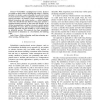Free Online Productivity Tools
i2Speak
i2Symbol
i2OCR
iTex2Img
iWeb2Print
iWeb2Shot
i2Type
iPdf2Split
iPdf2Merge
i2Bopomofo
i2Arabic
i2Style
i2Image
i2PDF
iLatex2Rtf
Sci2ools
ICRA
2005
IEEE
2005
IEEE
Learning-Assisted Multi-Step Planning
— Probabilistic sampling-based motion planners are unable to detect when no feasible path exists. A common heuristic is to declare a query infeasible if a path is not found in a fixed amount of time. In applications where many queries must be processed – for instance, robotic manipulation, multilimbed locomotion, and contact motion – a critical question arises: what should this time limit be? This paper presents a machine-learning approach to deal with this question. In an off-line learning phase, a classifier is trained to quickly predict the feasibility of a query. Then, an improved multi-step motion planning algorithm uses this classifier to avoid wasting time on infeasible queries. This approach has been successfully demonstrated in simulation on a four-limbed, free-climbing robot.
Feasible Path Exists | ICRA 2005 | Improved Multi-step Motion | Probabilistic Sampling-based Motion | Robotics |
| Added | 25 Jun 2010 |
| Updated | 25 Jun 2010 |
| Type | Conference |
| Year | 2005 |
| Where | ICRA |
| Authors | Kris K. Hauser, Timothy Bretl, Jean-Claude Latombe |
Comments (0)

